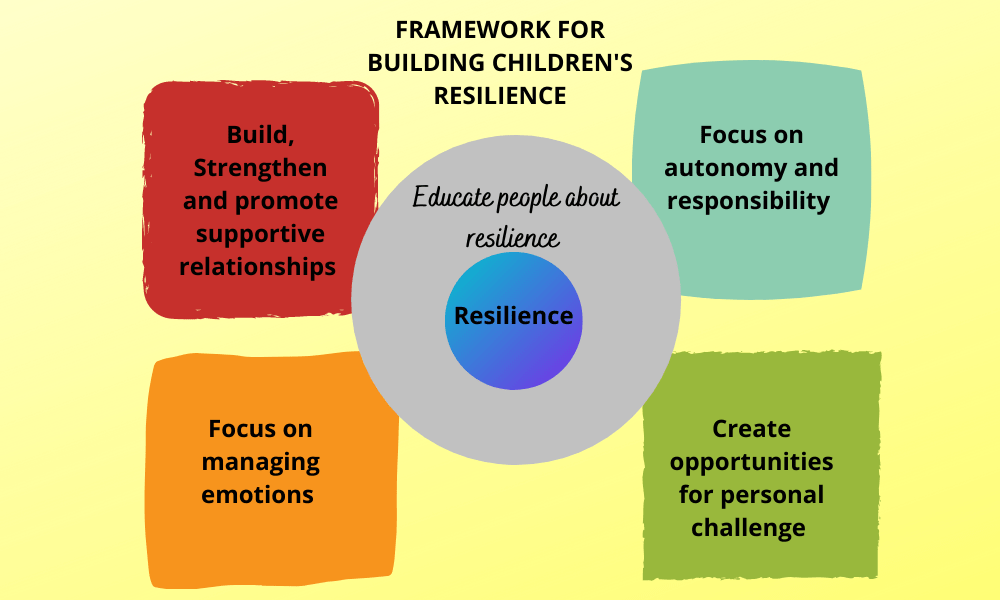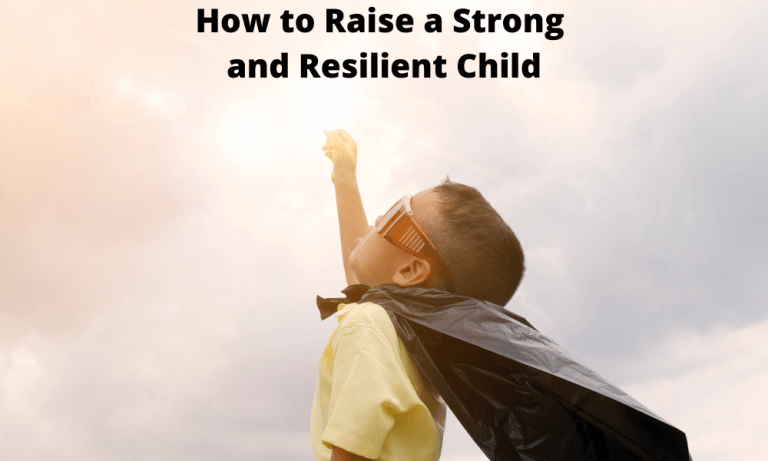The first time you look into the eyes of your newborn, you dream of a successful child. It is always the same for every parent. In order to make your child successful it is important to raise them to be strong-willed and resilient.
The best gift you can ever give to your child is not in providing everything for them, but in raising a final product of resilience and fine adaptability.
Have you ever wondered what is common celebrities like J.K. Rowling, Jim Carrey, Oprah Winfrey or Shania Twain? They are all highly successful, well respected and powerful personalities who have inspired us in many ways. But success didn’t come to them without struggles, rejection and even abuse in some instances.
Definition of a Resilient Child?
According to the Merriam-Webster dictionary, resilience is defined as “the ability to recover from or adjust easily to misfortune or change.” The ability to rise from defeat or recover is important, but that’s not it. A resilient child recovers from challenges, but they’ve learned to do more than that. They actually have a different mindset. A mindset of resiliency that deeply believes: I am not my mistakes, I can try again, things will get better, and I am not alone. In many ways, optimism is correlated to resilience.
Why is Being Strong-Willed and Resilient Important?
Every child wants everything they can lay their hands on, and sometimes, we parents give in to their demands and fail to realise that we have over-parented them.
When a child has a high dependency attitude and poor adaptability, it not only affects their growth and development, but it also creates anxiety, worries and pressure on you as a parent.
If you raise an independent, strong-willed and resilient kid, you have taken away 50% of parenting worries from your life!
When we fail to raise a child who can adapt to any situation, then we have not been fair to that child because the world does not revolve the way we want it to!
So many circumstances can arise, in which our child will have to face situations that will make them feel helpless, confused and abused.
Examples of Resilience in Children
In children, there are many examples that exhibit resiliency. A resilient child has one or more of these characteristics:
- Always trying your best even though you don’t succeed in achieving your objective in the first instance
- Bouncing back after a bad day or from a ‘failure’
- Have a clear set of goals and be focused
- ignore criticism that is not constructive
- Standing up for your beliefs and your aspirations
Resilient Parenting
Teaching resilience in early childhood is important. For example, your 2-year-old should learn how to eat and play on their own. You should be able to teach them how to do that at home before putting them into childcare.
Your teen should learn how to look after themselves before they leave for college. You should be able to teach them how to.
And finally, your adult child should be able to manoeuvre the challenges they face in marriage before they get married and not otherwise.
The truth is, we will not always be there for our children!
Sometimes we die before them, sometimes things happen and we cannot be with them at the moment, and during this period, they become targets for abuse and social pressure.
How about if you prepare them for all of these unforeseen life circumstances that can come at any time and take away all the pampering that you may have given to them?
When you raise strong-willed and resilient kids, then it’s a favour you’ve done for them, for yourself as a parent, for their relations, for their teachers, and finally to their spouses.
Everyone is willing to be associated with a strong, independent and intelligent child.
They will make friends easily and they will be able to get the love of people around them.
Ready to discover tips to raise strong-willed and resilient kids? Here are 7 tips to help you!
Can Resiliency be Developed in Your Child?
I often hear parents say “she is very resilient” or “he is very resilient” or “that child is very resilient”. So can resilience be nurtured? I remember when I was a young kid, I could hardly compete or would easily get disheartened. I started developing resilience once I started working as a youth and when faced with adversity and setbacks.
But this is something can be developed or nurtured even in kids, as it is not something coded in your genes. The experiences they’re exposed to how they adapt and learn to deal with them is what helps to develop resilience. At times, it is important that our kids face challenges and adversity. As parents, we should not always try to lift them over things that would cause them to stumble. Although it is hard for us as parents to implement this, we will not be doing any favours to our kids.

Source: https://www.beyondblue.org.au/
7 Tips to Raise Strong-Willed and Resilient Kids
1. Allow them to navigate their own difficulties
The best way to raise a resilient child, is to allow them navigate their own difficulties and find a long-lasting solution independently. The best way to go about this, is by teaching them how to navigate difficulties.
Allow them to come face-to-face with the realities of their difficulties. Teach them success doesn’t come on day 1, it’s a matter of trying. Positive affirmations are a great method I use with my kids to develop resilience and navigate difficult times.
Allow your 2+ year old navigate with their clothes, food, toys, until they can handle them single-handedly on their own.
When your child is being bullied at school, do not go to their school to fight for them.
Prepare them at home to be able to face their bully.
Teach them how to reply to their bully, teach them how to defend themselves, teach them how to report their bully fearlessly.
Show them with practice and story examples, how to deal with bullies, how to navigate a challenge and how to finally come out successful.
2. Don’t give them everything they ask
If you want a strong and resilient child, then learn how not to give them everything they ask!
Have limitations for your children, know their needs from wants and strive hard to provide all their needs but always maintain limitations when providing their wants.
When you expose your children to excess “wants” they forget how to be grateful and they become spoilt and dependent.
3. Teach them to show appreciation
A good child should be able to appreciate whatever you do for them, from the little things, to the big things that you provide for them.
You should teach them how to say ‘thank you’ and mean it, even when you buy them a pen.
Let them understand that there are so many other children out there who couldn’t get the chance to own even as little as a pen. Help them understand that whatever you are able to give them, is a privilege and not a right.
4. Let them fail
Allow your child to fail, if you want them to be resilient and strong.
“Nobody learns without failure”
Failure is the beginning of progress and experience, only when your child fails, will they be able to adapt and learn from the experience. Start using some growth mindset quotes. Quotes are great as they change your mood and inspire positive thinking.
Don’t over-correct them. Allow them to experience the pains of failure, so that next time, they won’t make the same mistake!
5. Take them out of their comfort zone
Once in a while, it is a good habit to take your children out of their comfort zone, so that they will be able to adapt to varying situations they find themselves in.
Take your children to stay with their grandparents. Take your children to stay with their aunties and also visit one or two places where there are underprivileged children.
Make them stay a few weeks out of their comfort zone.
6. Allow them to befriend the less privileged
Do not be one of those parents who teach their children how to mingle by class.
It won’t help them, it won’t make them appreciate you either- it will only teach them how to be full of themselves, temperamental and boastful.
And they start taking you and everything for granted!
7. Withdraw privileges once in a while
When you notice your child becoming too comfortable and failing to appreciate even the big things you do for them, then gradually learn to withdraw these privileges.
It’s not an act of sheer wickedness, but a tactic to mend and remodel!
When you withdraw privileges for a set period of time, your child will be able to appreciate them better when you give it to them again.
These are practical tips that will help you raise and remodel your child to be resilient and a survivor who is able to adapt to whatever situation they find themselves.
Remember some children are born with a strong-willed and resilient character. But it is a skill that can also be developed with the correct nurturing and parenting style. You can also use daily affirmations to change and develop a child’s mindset.
Self-Esteem and Confidence Journal
This journal is a collection of printable worksheets, posters, activities, and coloring pages designed to help children develop confidence, grit, resilience and perseverance. Grab this fun engaging journal and complete a few pages a day.

In Summary;
7 Tips to Raise Strong- Willed, Resilient Kids include;
1. Allow them navigate their own difficulties.
2. Don’t give them everything they ask.
3. Teach them to show appreciation.
4. Let them fail.
5. Take them out of their comfort zone.
6. Allow them befriend the less privileged.
7. Withdraw privileges once in a while.



3 Comments
An excellent read. Resilience and a strong will are the most important characteristics to be developed in a child. These simple tips will help any parent to go about doing this
Hi Tamara,
I love these tips. With all the advice and rules we hear all the time it can be so easy to over parent and over correct. It is so important for kids to understand their mistakes and also to realize they are not going to get everything they want at all times. I think it is great that you mention they should befriend less privileged. My daughter sometimes would come home from preschool and tell me how someone was sad because no one wanted to play with them. I always make sure to let her know she doesn’t need to do what everyone else does and that she should just be nice and play with everyone. As a child I was made fun of for what I was wearing since I didn’t have the ‘cool brands’ and it was heartbreaking. Teaching our kids that those things shouldn’t matter are very important. Great tips, thank you!
Heather
Pingback: Learn 5 Ways to Raise a Fearless and Confident Child